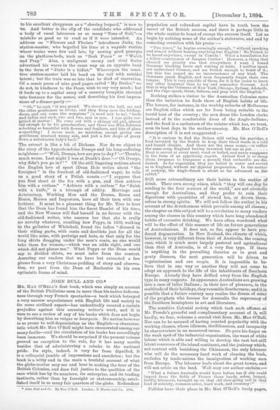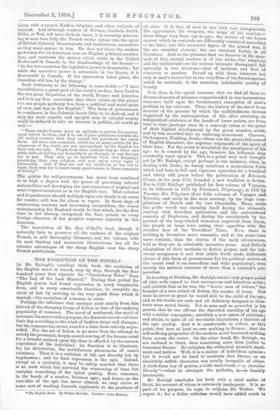JOHN BULL AND CO.*
Ma. Max O'RELL's first book, which was simply an account of the British Philistine seen in more than his native hideous- ness through very French spectacles—a book which betrayed a very narrow acquaintance with English life and society in its more civilised aspect—has undoubtedly created a certain prejudice against this amusing writer's work, and it is rare to see a review of any of his books which does not begin by describing him as vulgar or bourgeois. No nation however is so prone to self-depreciation as the English—a character- istic whieh Mr. Max O'Rell might have enumerated among our many faults—and the circulation of his books has accordingly been immense. We should be surprised if the present volume proved an exception to the rule, for it has many merits besides that of administering a rebuke to the national pride. Its style, indeed, is very far from dignified, it is a colloquial jumble of impressions and anecdotes ; but the book is a witty and in the main a truthful account of what the globe-trotter may see and hear in making the tour of the British Colonies, and does full justice to the qualities of the race which has by its numbers, its enterprise, and its trading instincts, rather than by foresight or statesmanship, estab- lished itself in so many fair quarters of the globe. Redundant
• John hull and Co. By Mar O'Roll. London : F. Warne and Co. 1E04.
population and redundant capital have in truth been the secret of the British success, and there is perhaps little in the whole matter to boast of except the success itself. Let us begin by noticing some of the author's strictures, and end by consoling ourselves with his praise :— " Two years," be begins amusingly enough, "without speaking and almost without hearing anything but English ! No French to be heard anywhere, except in Canada! What a humiliation for a fellow-countryman of Jacques Cartier ! However, a thing that cheered me greatly was that everywhere I wont I found Germans blacking boots and waiting at table. 1 neither speak nor understand German, and am foolish enough to boast of it ; but this has caused me no inconvenience of any kind. The Germans speak English, and even frequently forget their own tongue. This is vory sensible of them, for it is far easier to learn any other language than to try and remember German. And that is why the Germans of New York, Chicago, Sydney, Adelaide, and the Cape speak, think, believe, and pray with the English."
Nothing strikes a visitor to the Australian Colonies more than the imitation he finds there of English habits of life.
The houses, for instance, in the wealthy suburbs of Melbourne are English villas which are far from being suitable to the torrid heat of the country ; the men dress like London clerks instead of in the comfortable dress of the Anglo-Indians ; and the food is a caricature of the cuisine which has, we trust,
seen its best days in the mother-country. Mr. Max O'Rell's description of it is not exaggerated :—
" It is curious to find the Briton still eating his porridge, a food invented by the Scotch to keep their blood warm in a cold and humid climate. And there aro the same soups,—or rather the same soup, England having invented but one as yet Moat is served at every meal, roast or boiled, and never reappears in the form of an appetising ragout. Animal food is so cheap (from twopence to fourpence a pound) that rechauffiis are dis- dained. As for vegetables, teey are boiled in water and served as in England, without an:' dipecial preparation. In the matter of cookery, the Anglo-Saxon is about as far advanced as the rabbit," Still more extraordinary are their habits in the matter of drink. Their own strong wines, which " they will one day be sending to the four corners of the world," are not alcoholic enough for Australians, and they prefer to ruin their digestions with quantities of stewed tea, or drown them- selves in strong spirits. We will not follow the author in his account of the drunkenness which prevails among all classes ; the chapter on this subject will be a revelation to many readers among the classes in this country which have long abandoned habits of excessive drinking. We have often wondered what
will be the effect of this manner of life on future generations
of Australasians. It does not, so far, appear to have pro- duced degeneration. In New Zealand, the climate of whicii, however, is very different from that of Australia, the coming race, which is much more largely pastoral and agricultural than that of Australia, is of a very fine type. If there is anything in the prevailing theories as to gout and gouty diseases, the next generation will be driven to vegetarianism and can rougie. It is impossible to be- lieve that in one way or another they will not come to adopt an approach to the life of the inhabitants of Southern Europe. Already they have drifted away from the English type in many respects. In appearance Australians are growing into a race of taller Italians ; in their love of pleasure, in the multitude of their holidays, they resemble Southerners; and it is possible that a future century may realise the dream of some
of the prophets who foresee for Australia the supremacy of the Southern hemisphere in art and literature.
The sensitive Colonial society which took such offence at Mr. Froude's graceful and complimentary account of it, will
hardly, we fear, welcome a second visit from Mr. Max O'Rell. Nor can he be accused of having courted popularity with the working classes, whose idleness, thriftlessness, and incapacity he characterises in no measured terms. He puts his finger on the weak spot of the industrial organisation, the want of white labour which is able and willing to develop the vast but still latent resources of the island continent, and the jealousy which, not content with banishing the Chinaman, the only labourer who will do the necessary hard work of clearing the bush, excludes by trade-unions the immigration of working men from Europe. The labourer loafs about the great towns, and will not settle on the land. Welt may our author exclaim
"What a future Australia would have before her if she could import from the fields of Franco those hardy, sober, honest, thrifty labourers, brought up on that old slow-going soil in that land of sobriety, common-sense, hard work, and economy!"
. Politics have their place in Mr. Max O'Rell's lively pages,
along with serpents, Kaffirs, religions, and other subjects of interest. And although readers of Hubner, Goldwin Smith, Dilke, or Tod, will have little to learn, it is certainly interest- ing to note how fully the French writer enters into the spirit of British Colonial Governments and institutions, anomalous as they must appear to him. He does not share the modern preference for an American over an English political constitu- tion, and contrasts the system which exists in the United States and in Canada to the disadvantage of the former: " In the two countries the legislative power is democratic ; but while the executive power is autocratic in the States, it is democratic in Canada. If the annexation takes place, the Canadian will lose by the change."
Such testimony as the following is remarkable :—" I have travelled over a great part of the earth's surface, have lived in the two great Republics of the world, France and America, and it is my firm conviction that there exists on this planet but one people perfectly free from a political and social point of view, and that is the English." The form of government, he continues, in the Colonies leaves little to be desired, and if only the most capable and upright men in colonial society could be induced to take an interest in politics, all would go well :-
"These Anglo-Saxons have an aptitude or genius for govern- ment inborn in them, and it is out of pure politeness towards the old mother-country that they accept the governors she sends them. All those new countries, which are so many outlets for the commerce of the world, are not monopolised by the English for their own use only. People from other nations may go there and settle without having any formality to go through, or any foreign tax to pay. They may go on speaking their own language, practicing their own religion, and may enjoy every right of citizenship. And if they are not too stubborn, or too old to learn, they may lay to heart many good lessons in these nurseries of liberty.'
The genius for self-government has never been combined in so high a degree with the power of governing inferior nationalities and developing the vast resources of tropical and semi-tropical countries as in the English race. That colonies and dependencies should multiply upon our hands is no cause for wonder, still less for alarm or regret. In these days of contracting markets and increasing competition, the wisest statesmanship for England would be that which, for the first time in her history, recognised the fact, patent to every foreign observer, of her people's supreme capacity in this direction.
The translation of Mr. Max O'Rell's book, though it naturally fails to preserve all the raciness of the original French, is still thoroughly idiomatic, and the volume, with its neat binding and numerous illustrations, has all the exterior advantages of the cheap English over the cheap French publication.



















































 Previous page
Previous page